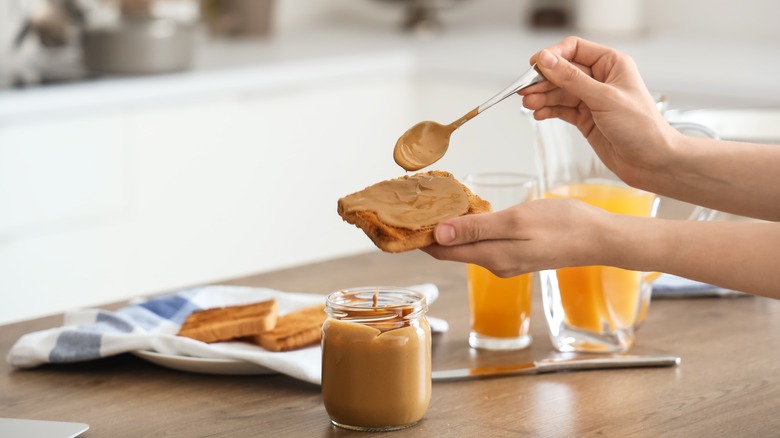When You Eat Peanut Butter Every Day, This Is What Happens To Your Arteries
At this moment, your heart is pumping oxygen-rich blood through your arteries to all parts of your body. Your brain and other organs need a fresh supply of blood to function, so your arteries must remain relatively flexible and clear of excess plaque, which can obstruct the flow of blood. When you have too much plaque, it can also break off the walls of your arteries and cause a blood clot. Depending on the location of your blood clot, you could suffer a stroke or heart attack.
The excess plaque in your arteries can also harden and thicken the walls, which is called "atherosclerosis." You might not notice if an artery is blocked until it's 70% blocked. Along with smoking, diabetes, and high blood pressure, too much cholesterol circulating in your blood can cause damage to your arteries and result in atherosclerosis.
According to the Harvard T.H. Chan School of Public Health, your blood cholesterol is not so much about how much cholesterol is in your food but the combination of fats and carbohydrates that you eat. When your diet is high in saturated fat, the liver's LDL ("bad" cholesterol) receptors get overworked and LDL can't be processed as well in the liver (per Heart UK). As a result, LDL cholesterol builds up in your bloodstream. When you eat peanut butter every day, you could put your arteries at risk because it has saturated fat.
Peanut butter is fine in moderation
Two tablespoons of smooth peanut butter has 188 calories and almost 16 grams of fat with no cholesterol. You'll want to pay closer attention to the proportion of saturated fats and unsaturated fats. Peanut butter has 3 grams of saturated fat versus 9 grams of unsaturated fat, which means there is three times more unsaturated fat than saturated fat. While saturated fat is often tied to heart disease because it raises LDL cholesterol, it also raises HDL cholesterol. HDL cholesterol is what sweeps your arteries of cholesterol so it can be processed by the liver. The unsaturated fat works to lower your LDL cholesterol.
However, nutrition professors at Harvard Medical School suggest avoiding eating too much peanut butter because it can lead to atherosclerosis. Instead, it might be wise to include other types of nuts and nut butter as part of an overall healthy diet. The American Heart Association suggests getting no more than 5% or 6% of your daily calories from saturated fat, which comes to about 13 grams for a 2,000-calorie diet. Two tablespoons of peanut butter's 3 grams of saturated fat will fit into this window, but you'll have to watch the saturated fat from other foods as well if you want to protect your arteries.
Peanut butter has other health benefits
Whether you choose regular, reduced-sodium, or reduced-fat peanut butter, you'll still get plenty of vitamins and minerals. Even regular peanut butter has more potassium than sodium, which can be good for keeping your fluid levels and blood pressure in balance. Peanut butter will give you 15% of your daily magnesium to regulate your mood, sleep, blood pressure, and blood sugar. Niacin (vitamin B3) is abundant in peanut butter to cool inflammation and boost circulation. Regular peanut butter also provides 22% of your daily vitamin E, which is not only an antioxidant but also keeps your skin and eyes healthy.
Peanut butter isn't considered a complete protein, which means you don't get enough of all nine essential amino acids. However, you'll find plenty of amino acids in this sandwich spread. You can turn to peanut butter for 43% of the amino acid phenylalanine, which helps produce neurotransmitters such as norepinephrine that reduce hunger pains and can improve your memory. Bodybuilders love leucine for its ability to build muscle, and peanut butter has 18% of your recommended amount.



